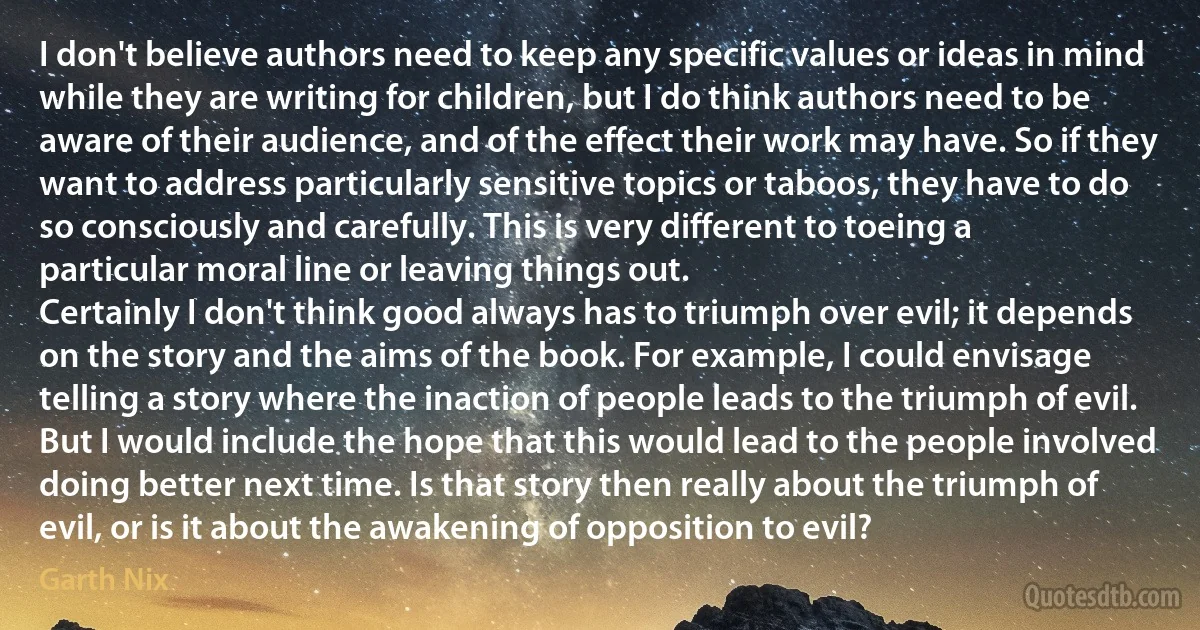
I don't believe authors need to keep any specific values or ideas in mind while they are writing for children, but I do think authors need to be aware of their audience, and of the effect their work may have. So if they want to address particularly sensitive topics or taboos, they have to do so consciously and carefully. This is very different to toeing a particular moral line or leaving things out. Certainly I don't think good always has to triumph over evil; it depends on the story and the aims of the book. For example, I could envisage telling a story where the inaction of people leads to the triumph of evil. But I would include the hope that this would lead to the people involved doing better next time. Is that story then really about the triumph of evil, or is it about the awakening of opposition to evil?
Garth NixRelated topics
believe book children different evil example good hope lead leaving line mind need next people sensitive specific story telling think time while work thingsRelated quotes
In general, it is possible to say that in artists as deliberate, as careful as [Durer and Holbein], drawing is particularly tight and the color is as cold as the verity of mathematics. In other artists, on the contrary, in those who are the poets of the heart, like Raphael, Correggio, Andrea del Sarto, line has more suppleness and color, more winning tenderness. In others whom we call realists that is to say, whose sensibility is more exterior, in Rubens, Velasquez, Rembrandt, for example, line has a living charm with its force and its repose, and the color sometimes bursts into a fanfare of sunlight, sometimes fades into mist.
So, the modes of expression of men of genius differ as much as their souls, and it is impossible to say that in some among them drawing and color are better or worse than in others.

Auguste Rodin
The third and intermediate kind of instruction, which connects the first two... relates to the application of scientific principles to practical purposes. It qualifies the student to plan a structure or a machine for a given purpose, without the necessity of copying some existing example, and to adapt his designs to situations to which no existing example affords a parallel. It enables him to compute the theoretical limit of the strength or stability of a structure, or the efficiency of a machine of a particular kind-to ascertain how far an actual structure or machine fails to attain that limit-to discover the cause of such shortcomings-and to devise improvements for obviating such causes; and it enables him to judge how far an established practical rule is founded on reason, how far on mere custom, and how far on error.

William John Macquorn Rankine
What! when it is necessary to take the most simple resolve, we are under the domination of our habitudes, our wants, our social relations, and a host of causes which, all of them, draw us about in a hundred different ways. These influences are so powerful, that we have no difficulty in telling, even when referring to persons whom we are scarcely acquainted with, or even know not at all, what is the resolution to which they will lead such parties. Whence, then, this certainty of foresight, exemplified by you daily, if you were not convinced, at the outset, that it is extremely probable the empire of causes will carry it over free-will. In considering the moral world a priori, you give to this free-will the most entire latitude; and when you come to practice, when you speak of what passes around you, you constantly fall into contradiction with yourselves.

Adolphe Quetelet
One can ask two different kinds of questions with regard to the topics of study in psychology as well as in other sciences. One can ask for the phenomenal characteristics of psychological units or events, for example, how many kinds of feelings can be qualitatively differentiated from one another or which characteristics describe an experience of a voluntary act. Aside from this are the questions asking for the why, for the cause and the effect, for the conditional-genetic interrelations. For example, one can ask: Under which conditions has been a decision made and which are the specific psychological effects which follow this decision? The depiction of phenomenal characteristics is usually characterized as "description”, the depiction of causal relationships as "explanation.”.

Kurt Lewin
Successes in socialist construction largely depend on the correct combination of the general and the nationally specific in social development. Not only are we now theoretically aware but also have been convinced in practice that the way to socialism and its main features are determined by the general regularities, which are inherent in the development of all the socialist countries. We are also aware that the effect of the general regularities is manifested in different forms consistent with concrete historical conditions and national specifics. It is impossible to build socialism without basing oneself on general regularities or taking account of the concrete historical specifics of each country. Nor is it possible without a consideration of both these factors correctly to develop relations between the socialist states.

Leonid Brezhnev
